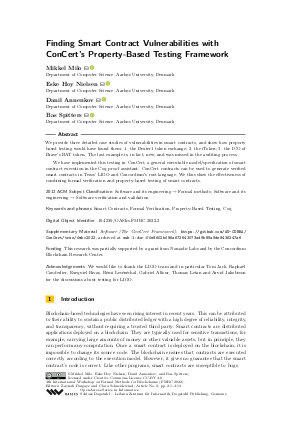Finding Smart Contract Vulnerabilities with ConCert’s Property-Based Testing Framework
Authors
Mikkel Milo  ,
Eske Hoy Nielsen
,
Eske Hoy Nielsen  ,
Danil Annenkov
,
Danil Annenkov  ,
Bas Spitters
,
Bas Spitters 
-
Part of:
Volume:
4th International Workshop on Formal Methods for Blockchains (FMBC 2022)
Part of: Series: Open Access Series in Informatics (OASIcs)
Part of: Conference: Workshop on Formal Methods for Blockchains (FMBC) - License:
 Creative Commons Attribution 4.0 International license
Creative Commons Attribution 4.0 International license
- Publication Date: 2022-10-06
File

PDF
OASIcs.FMBC.2022.2.pdf
- Filesize: 0.82 MB
- 13 pages
Document Identifiers
Subject Classification
ACM Subject Classification
- Software and its engineering → Formal methods
- Software and its engineering → Software verification and validation
Keywords
- Smart Contracts
- Formal Verification
- Property-Based Testing
- Coq
Metrics
- Access Statistics
-
Total Accesses (updated on a weekly basis)
0Document
0Metadata
Abstract
We provide three detailed case studies of vulnerabilities in smart contracts, and show how property based testing would have found them: 1. the Dexter1 token exchange; 2. the iToken; 3. the ICO of Brave’s BAT token. The last example is, in fact, new, and was missed in the auditing process. We have implemented this testing in ConCert, a general executable model/specification of smart contract execution in the Coq proof assistant. ConCert contracts can be used to generate verified smart contracts in Tezos' LIGO and Concordium’s rust language. We thus show the effectiveness of combining formal verification and property-based testing of smart contracts.
Cite As Get BibTex
Mikkel Milo, Eske Hoy Nielsen, Danil Annenkov, and Bas Spitters. Finding Smart Contract Vulnerabilities with ConCert’s Property-Based Testing Framework. In 4th International Workshop on Formal Methods for Blockchains (FMBC 2022). Open Access Series in Informatics (OASIcs), Volume 105, pp. 2:1-2:13, Schloss Dagstuhl – Leibniz-Zentrum für Informatik (2022)
https://doi.org/10.4230/OASIcs.FMBC.2022.2
BibTex
@InProceedings{milo_et_al:OASIcs.FMBC.2022.2,
author = {Milo, Mikkel and Nielsen, Eske Hoy and Annenkov, Danil and Spitters, Bas},
title = {{Finding Smart Contract Vulnerabilities with ConCert’s Property-Based Testing Framework}},
booktitle = {4th International Workshop on Formal Methods for Blockchains (FMBC 2022)},
pages = {2:1--2:13},
series = {Open Access Series in Informatics (OASIcs)},
ISBN = {978-3-95977-250-1},
ISSN = {2190-6807},
year = {2022},
volume = {105},
editor = {Dargaye, Zaynah and Schneidewind, Clara},
publisher = {Schloss Dagstuhl -- Leibniz-Zentrum f{\"u}r Informatik},
address = {Dagstuhl, Germany},
URL = {https://drops.dagstuhl.de/entities/document/10.4230/OASIcs.FMBC.2022.2},
URN = {urn:nbn:de:0030-drops-171834},
doi = {10.4230/OASIcs.FMBC.2022.2},
annote = {Keywords: Smart Contracts, Formal Verification, Property-Based Testing, Coq}
}
Author Details
Funding
This research was partially supported by a grant from Nomadic Labs and by the Concordium Blockchain Research Center.
Acknowledgements
We would like to thank the LIGO team and in particular Tom Jack, Raphaël Cauderlier, Exequiel Rivas, Rémi Lesénéchal, Gabriel Alfour, Thomas Letan and Arvid Jakobsson for the discussions about testing for LIGO.
Supplementary Materials
-
Software (The ConCert Framework)
https://github.com/AU-COBRA/ConCert/tree/fmbc2022
browse
 archived version
archived version
References
- Guillermo Angeris, Hsien-Tang Kao, Rei Chiang, Charlie Noyes, and Tarun Chitra. An Analysis of Uniswap markets. Cryptoeconomic Systems, 1(1), 2021. URL: https://doi.org/10.21428/58320208.c9738e64.
- Danil Annenkov, Mikkel Milo, Jakob Botsch Nielsen, and Bas Spitters. Extracting Smart Contracts Tested and Verified in Coq. In CPP'2020. Association for Computing Machinery, 2021. URL: https://doi.org/10.1145/3437992.3439934.
- Danil Annenkov, Jakob Botsch Nielsen, and Bas Spitters. ConCert: A Smart Contract Certification Framework in Coq. In CPP'2020, 2020. URL: https://doi.org/10.1145/3372885.3373829.
-
Bruno Bernardo, Raphaël Cauderlier, Zhenlei Hu, Zhenlei Pesin, and Julien Tesson. Mi-Cho-Coq, a framework for certifying Tezos Smart Contracts. In FMBC19, 2019.

- James Chapman, Roman Kireev, Chad Nester, and Philip Wadler. System F in Agda, for fun and profit. In MPC'19, 2019. URL: https://doi.org/10.1007/978-3-030-33636-3_10.
- Kim Grauer, Will Kueshner, and Henry Updegrave. Chainalysis 2022 Crypto Crime Report. Chainalysis 2022, 2022. URL: https://go.chainalysis.com/2022-Crypto-Crime-Report.html.
- Gustavo Grieco, Will Song, Artur Cygan, Josselin Feist, and Alex Groce. Echidna: effective, usable, and fast fuzzing for smart contracts. In Proceedings of the 29th ACM SIGSOFT International Symposium on Software Testing and Analysis, pages 557-560, 2020. URL: https://doi.org/10.1145/3395363.3404366.
- Zoe Paraskevopoulou, Catalin Hritcu, Maxime Dénès, Leonidas Lampropoulos, and Benjamin C. Pierce. Foundational property-based testing. In Christian Urban and Xingyuan Zhang, editors, 6th International Conference on Interactive Theorem Proving (ITP), volume 9236 of Lecture Notes in Computer Science, pages 325-343. Springer, 2015. URL: https://doi.org/10.1007/978-3-319-22102-1_22.
- Matthieu Sozeau, Abhishek Anand, Simon Boulier, Cyril Cohen, Yannick Forster, Fabian Kunze, Gregory Malecha, Nicolas Tabareau, and Théo Winterhalter. The MetaCoq Project. Journal of Automated Reasoning, February 2020. URL: https://doi.org/10.1007/s10817-019-09540-0.
- Qingzhao Zhang, Yizhuo Wang, Juanru Li, and Siqi Ma. EthPloit: From Fuzzing to Efficient Exploit Generation against Smart Contracts. In 2020 IEEE 27th International Conference on Software Analysis, Evolution and Reengineering (SANER), 2020. URL: https://doi.org/10.1109/SANER48275.2020.9054822.
